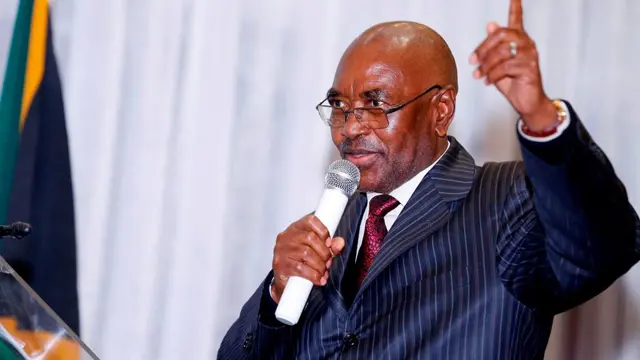
Former KwaZulu-Natal premier Willies Mchunu
Former KwaZulu-Natal premier Willies Mchunu has resigned from the ANC, citing concerns about the party’s current trajectory.
Mchunu is a former ANC deputy provincial chairperson and long-term ally of Jacob Zuma, the leader of uMkhonto weSizwe (MK) party, and has been critical of the governing party’s decision not to involve the breakaway party in the government of national unity (GNU) constituted after the 29 May election.
Mchunu referenced the formation of the GNU and the KwaZulu-Natal government of provincial unity as key issues influencing his decision.
In his resignation letter, Mchunu said that after reflecting on the ANC’s position after the elections, he no longer believed he could contribute effectively to the party.
He said that after the ANC lost its electoral majority, he had expressed differing views on the party’s direction and had faced strong criticism for doing so.
During one provincial executive committee (PEC), he was informed that party leaders had questioned his ability to advise on such matters, he said.
“I was told that in one group, ANC leaders called me politically ignorant and said I don’t understand communism. At a PEC meeting, I heard leaders questioning who I was to tell them what to do,” Mchunu wrote.
Mchunu served as premier of KwaZulu-Natal from May 2016 to May 2019.
A former trade unionist, Mchunu has a long history with the South African Communist Party, where he previously served as KwaZulu-Natal provincial chairperson and was a member of the SACP’s central committee.
While Mchunu said he accepted the ANC’s decision to work within the framework of a unity government, he highlighted concerns about his ability to contribute positively to the party.
“I have come to the conclusion that I am no longer adding value to the ANC and find myself increasingly critical of several issues within both the organisation and government,” he wrote.
Mchunu also addressed broader concerns about the ANC’s commitment to advancing the “national democratic revolution”, stating that he had become uncertain about the party’s ability to pursue these goals in the current political environment.
Mchunu said although his decision to leave the ANC could bring personal problems, such as potential criticism from party members and the loss of friendships, he believed stepping away was necessary.
ANC KwaZulu-Natal secretary Bheki Mtolo, in a letter leaked to the media, responded to Mchunu’s resignation by acknowledging the significance of his decision.
While expressing regret, Mtolo said the ANC was “a voluntary organisation” and that it respected Mchunu’s choice to resign.
Mtolo also addressed Mchunu’s concerns about the unity government, saying the ANC had a history of forming alliances with other parties and had done so in the early days of democracy.
Mtolo reminded Mchunu that from 1994 to 1999, the ANC had worked with the National Party, “which had overseen many of the atrocities committed under apartheid”, and with the Inkatha Freedom Party (IFP), which clashed violently with the ANC, particularly in KwaZulu-Natal.
Mtolo pointed out that ANC leaders such as Zuma, S’bu Ndebele, and Zweli Mkhize had worked alongside the IFP to co-govern the province during that time.
Mtolo asked Mchunu to clarify which elements of the GNU framework led him to believe the ANC was no longer advancing the national democratic revolution.
He also raised questions about Mchunu’s views on Zuma’s role in the current political landscape, specifically regarding Zuma’s decision to form his own political party, which affected the ANC’s support in KwaZulu-Natal, Gauteng and Mpumalanga.
Mtolo wished Mchunu well and acknowledged his longstanding contributions to the party, adding that the ANC would continue to respect his teachings and his legacy as a party member.
An MK party source said Mchunu had not joined the party “yet”
Source:
mg.co.za
Source link

